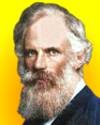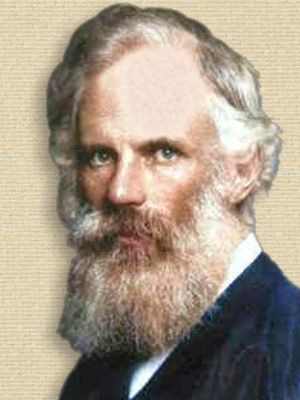 (source)
(source)
|
George Francis Fitzgerald
(3 Aug 1851 - 21 Feb 1901)
Irish physicist whose suggestion of a way to produce waves helped lay a foundation for wireless telegraphy. He shared development of the theory of Lorentz-FitzGerald contraction. Fitzgerald studied electrolysis and electromagnetic radiation. He also proposed a structure for comets.
|
Science Quotes by George Francis Fitzgerald (3 quotes)
Maxwell, like every other pioneer who does not live to explore the country he opened out, had not had time to investigate the most direct means of access to the country, or the most systematic way of exploring it. This has been reserved for Oliver Heaviside to do. Maxwell’s treatise is cumbered with the débris of his brilliant lines of assault, of his entrenched camps, of his battles. Oliver Heaviside has cleared those away, has opened up a direct route, has made a broad road, and has explored a considerable tract of country.
— George Francis Fitzgerald
Book Review of Heaviside’s Electrical Papers in The Electrician (11 Aug 1893). Collected in Joseph Larmore (ed.), The Scientific Writings of the Late George Francis FitzGerald (1902), 294.
The development of habits is necessary for the individual, and hence for the race, but it stops development along new lines.
— George Francis Fitzgerald
From 'Helmholtz Memorial Lecture' (Jan 1896), printed in Journal of the Chemistry Society (1896), 886.
This maze of symbols, electric and magnetic potential, vector potential, electric force, current, displacement, magnetic force, and induction, have been practically reduced to two, electric and magnetic force.
— George Francis Fitzgerald
Describing Heaviside’s refinement of the original Maxwell Equations. In Joseph Larmore (ed.), The Scientific Writings of the Late George Francis Fitzgerald (1902) 294.
Quotes by others about George Francis Fitzgerald (1)
When the 1880s began. Maxwell’s theory was virtually a trackless jungle. By the second half of the decade, guided by the principle of energy flow. Poynting, FitzGerald, and above all Heaviside had succeeded in taming and pruning that jungle and in rendering it almost civilized.
In The Maxwellians (2008), 128.
See also:
- 3 Aug - short biography, births, deaths and events on date of Fitzgerald's birth.

 In science it often happens that scientists say, 'You know that's a really good argument; my position is mistaken,' and then they would actually change their minds and you never hear that old view from them again. They really do it. It doesn't happen as often as it should, because scientists are human and change is sometimes painful. But it happens every day. I cannot recall the last time something like that happened in politics or religion.
(1987) --
In science it often happens that scientists say, 'You know that's a really good argument; my position is mistaken,' and then they would actually change their minds and you never hear that old view from them again. They really do it. It doesn't happen as often as it should, because scientists are human and change is sometimes painful. But it happens every day. I cannot recall the last time something like that happened in politics or religion.
(1987) -- 


